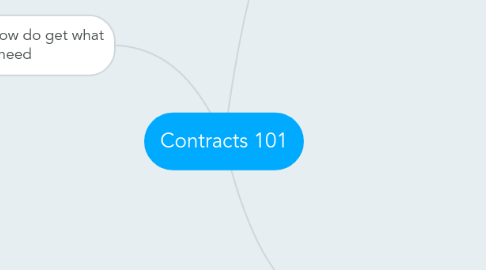
1. How do get what you need
1.1. How to make it happen (action)
1.1.1. Search the internet
1.1.1.1. Pros
1.1.1.1.1. Totally free
1.1.1.1.2. Millions of options
1.1.1.2. Cons
1.1.1.2.1. Free is the quickest way to end up with really expensive.
1.1.1.2.2. Anyone can write a word document, but when you and someone else sign what you intend to be a legally binding contract, then that word document takes on magical powers. You want to have those magical powers work for you, and not destroy what you're working to build.
1.1.2. Copy from someone else
1.1.2.1. Pros
1.1.2.1.1. Typically free
1.1.2.1.2. Lots of options
1.1.2.2. Cons
1.1.2.2.1. Free is the quickest way to end up with really expensive.
1.1.2.2.2. If they had it made for themselves, then they are covered and you are potentially not covered (no two fingerprints are the same, and the same is true for businesses).
1.1.2.2.3. If they copied from someone else, then you now risk having exposure and or liability based on the first level of copying, and are now adding an additional level of copying.
1.1.3. Use a self-help product or service BIZLEBOX™
1.1.3.1. Pros
1.1.3.1.1. Affordable
1.1.3.1.2. Lots of options
1.1.3.1.3. Companies are working to provide the best one-size-fits-most product that they can.
1.1.3.2. Cons
1.1.3.2.1. You may unknowingly use a self-help product when you really needed a customized one.
1.1.4. Using an attorney you know, like, and trust.
1.1.4.1. Pros
1.1.4.1.1. You have an expert on your team.
1.1.4.1.2. They went to school to know how to use words, reasoning, and logic to solve your problems, and strategize fro avoiding them.
1.1.4.1.3. You are building a relationship for your business, with the person who knows the rule book.
1.1.4.2. Cons
1.1.4.2.1. They're not cheap, although they are a tax deduction.
2. What are they?
2.1. Why do you need to know this?
2.1.1. To avoid misunderstandings and misinformation.
2.2. Positives
2.2.1. Keep memories out of the equation.
2.2.2. Force both parties to get their expectations down in writing.
2.2.3. Reduce misunderstandings.
2.3. How to make it happen (action)
2.3.1. Simply understand and accept that contracts aren't an optional part of business.
2.3.2. Paying taxes is not optional.
2.3.3. Having a payment system is not optional.
3. Which ones do you need?
3.1. Why do you need to know this?
3.1.1. There are many different kinds of contracts, and you need to use the correct one.
3.2. Positives
3.2.1. You use the right one.
3.2.2. You have the terms inside the contract that you need.
3.3. How to make it happen (action)
3.3.1. First, know what kind of a contract you need.
3.3.1.1. If you're selling an online course, then you need a COURSE PARTICIPANT CONTRACT.
3.3.1.2. If you're having someone else contribute to your website, blog, online program, live event, etc., then you need a GUEST CONTRIBUTOR AGREEMENT.
3.3.1.2.1. WHAT IS IT?
3.3.1.2.2. WHO NEEDS IT?
3.3.1.2.3. WHEN DOES IT APPLY?
3.3.1.2.4. HOW DO I GET ONE?
3.3.1.3. If you're hiring someone to do work for you, then you need to understand if you need an EMPLOYMENT CONTRACT, or an INDEPENDENT CONTRACTOR AGREEMENT.
3.3.1.4. If you're using affiliate marketing in your business, then you need to have an AFFILIATE AGREEMENT signed by each affiliate.
3.3.1.5. If you're providing a service for another company, you need to know whether you need an INDEPENDENT CONTRACTOR agreement, or a CONTRACT FOR SERVICES.
3.3.2. Next, then get the contract(s) you need.

